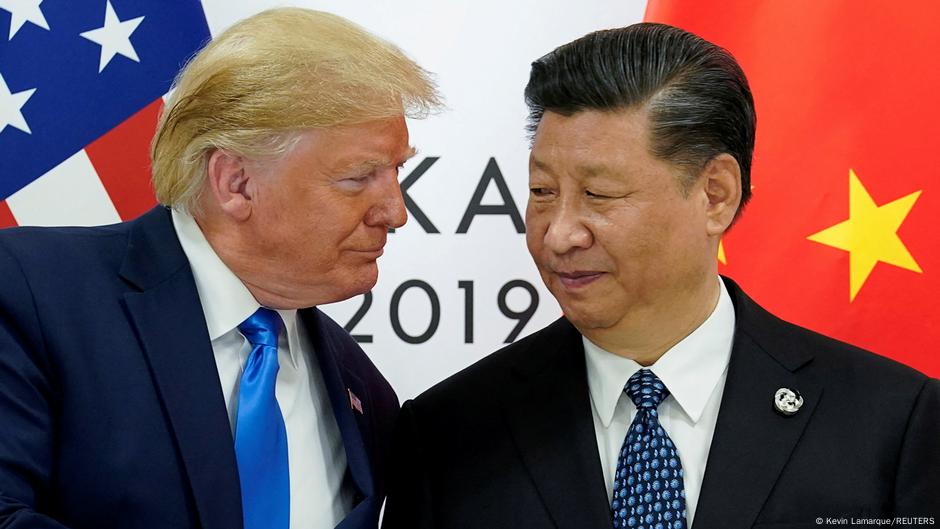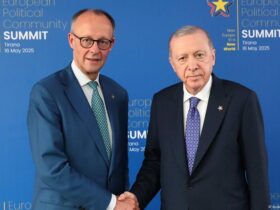The US and China have set the stage for a high-risk meeting between Donald Trump and Xi Jinping, just weeks after the trade war between the two leaders escalated.
Ahead of Thursday’s meeting on the sidelines of the Asia-Pacific Economic Cooperation summit (APEC), trade representatives from both sides said they would sign a framework agreement involving lower US tariffs on Chinese imports and a delay in curbs on rare earth exports by China.
After arriving in South Korea on Wednesday, Trump said he hoped ‘a lot of problems’ would be resolved during the talks.
Trump surprised markets earlier this month by announcing 100% tariffs on Chinese imports after China said it would restrict exports of rare earth minerals, which are needed to manufacture high-tech goods.
Stock markets around the world have gained momentum this week on the prospect of the leaders of the world’s two largest economies returning to the negotiating table.
Although details of the framework deal have not been made public, on Sunday US Treasury Secretary Scott Besant told US media outlets that it would likely include “some kind of moratorium” on Chinese rare earth mineral export controls and for China to buy “substantial” amounts of US soybeans.
Besant also said that Trump’s threat of 100% tariffs was “effectively off the table”.
“It looks like both sides are making some concessions, which is making outsiders, especially investors, feel a little more optimistic,” Dennis Weng, an associate professor of political science at Sam Houston State University, told DW.
However, Weng said the truth now emerging is unlikely to change the “fundamental dynamics of strategic rivalry” between Beijing and Washington in the long term.
“Everyone knows competition is on, but they don’t want it to lead to a sudden economic collapse,” Weng said. He said the two countries aim to “slowly let the effects of their increasingly strained relations subside”.
China benefits more under Trump 2.0
The meeting in South Korea will be Trump’s first in-person meeting with Xi during his second term. The two leaders have spoken on phone at least three times this year, most recently in September.
Trump began his presidency by unveiling sweeping tariffs on countries around the world, but China was able to push back against them by using its immense economic leverage.
This includes halting purchases of US soybeans from the current crop, which has caused billions in losses to American farmers.
Beijing’s threat of export controls on rare earths earlier this month was seen as a major escalation, as China mines about 70% of the global total, while controlling more than 90% of refining capacity.
The development has created a sense of déjà vu, as Trump last met Xi in person during his first term in office in 2019 after launching the first trade war against China. But Beijing may be less willing to compromise this time.
“Xi Jinping feels much more confident. He is probably willing to push his position a little more strongly,” Jae Ian Chong, an associate professor of political science at the National University of Singapore, told DW.
Weng also noted that “Beijing has studied Trump very thoroughly” to calculate his next move, with some concessions strategically arranged in advance as bargaining chips.
“In fact, China stopped buying soybeans immediately after Trump took office in January, so this shows that the whole soybean issue was planned all along,” he said.
Will Xi put pressure on Trump on Taiwan?
Beyond trade disputes, Trump’s discussions with Xi are expected to include geopolitical tensions over Taiwan, the self-ruled democracy that Beijing claims as Chinese territory and has not ruled out using force to achieve “reunification.”
The US, while maintaining no formal diplomatic relations with Taiwan, remains the island’s main security supporter and provider of military equipment and weapons.
Ahead of the Trump-Xi meeting, concerns have arisen over a possible shift in US support for Taiwan.
wall street journal It was first reported in September that Xi was increasing pressure on the Trump administration to officially declare that he “opposes Taiwan independence.”
“There is every possibility that [Trump] Some will make Taiwan-related comments that Beijing views as harmless or non-provocative — Trump goes along with that, analyst Weng said.
Amid the concerns, US Secretary of State Marco Rubio said on Saturday that the Trump administration would not abandon long-standing US support for Taiwan in talks with China to reach a trade deal.
On Tuesday, Taiwan’s Foreign Minister Lin Chia-lung said he was not worried that Trump would turn his back on Taiwan.
However, Weng told DW that Rubio’s statement was still vague, as the U.S. approach toward Taiwan “has always been quite flexible, with a wide range of options.”
This policy of America is known as “strategic ambiguity”.
Any change in the decades-old US stance, which it officially says “does not support Taiwan independence,” would be a major diplomatic victory for Beijing and leave the island in a vulnerable position.
Analyst Chong believes that a major change in US rhetoric on Taiwan is unlikely to occur, given the island’s strategic position in the Indo-Pacific, as this change “would also bring about a major change in the entire region”. [Indo-Pacific] Area.”
What’s next for US-China relations?
Trump arrived in South Korea on Wednesday, but is scheduled to depart the next day, skipping the main agenda of the APEC summit.
He reportedly told the room full of CEOs at the summit that he believed the US was “going to make a deal” with China and that it would be “a good deal for both.”
Earlier, Trump also said he planned to visit China early next year, without giving any specific timeline.
Weng hopes that the period from the upcoming talks to Trump’s visit to China will bring about a relative reduction in tensions between the two sides.
But Chong cautioned that although the Trump-Xi summit provides a window for signals, “what happens after the meetings is no less important.”
“The thing to remember is that for both the US and the PRC [China]They’re quite willing and able to walk away from any compromise they make.”
Edited by: Wesley Rahn






Leave a Reply